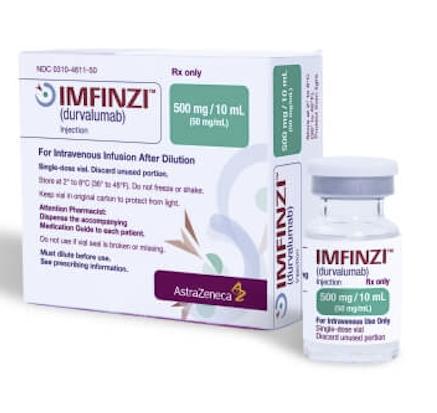Imfinzi Side Effects
Generic name: durvalumab
Medically reviewed by Drugs.com. Last updated on Apr 7, 2023.
Note: This document contains side effect information about durvalumab. Some dosage forms listed on this page may not apply to the brand name Imfinzi.
Applies to durvalumab: intravenous solution.
Serious side effects of Imfinzi
Along with its needed effects, durvalumab (the active ingredient contained in Imfinzi) may cause some unwanted effects. Although not all of these side effects may occur, if they do occur they may need medical attention.
Check with your doctor or nurse immediately if any of the following side effects occur while taking durvalumab:
More common
- Bladder pain
- bloating or swelling of the face, arms, hands, lower legs, or feet
- bloody or cloudy urine
- body aches or pain
- chest pain or tightness
- chills
- cough
- depressed mood
- difficult, burning, or painful urination
- difficulty having a bowel movement
- dry skin and hair
- ear congestion
- feeling cold
- fever
- frequent urge to urinate
- general feeling of discomfort or illness
- headache
- hoarseness, husky, or loss of voice
- lower back or side pain
- muscle cramps and stiffness
- nervousness
- runny or stuffy nose
- sensitivity to heat
- slowed heartbeat
- sneezing
- sore throat
- stomach cramps
- sweating
- tenderness
- thickening of bronchial secretions
- tingling of the hands or feet
- trouble breathing
- trouble sleeping
- unusual tiredness or weakness
- unusual weight gain or loss
- watery or bloody diarrhea
Less common
- Back, leg, or stomach pains
- black, tarry stools
- bleeding gums
- bloody nose
- blurred vision or other changes in vision
- dark urine
- eye redness, irritation, or pain
- general body swelling
- heavier menstrual periods
- light-colored stools
- loss of appetite
- nausea
- nosebleeds
- pale skin
- pinpoint red spots on the skin
- sensitivity of the eye to light
- skin rash
- stiff neck or back
- tearing
- unusual bleeding or bruising
- upper right abdominal or stomach pain
- vomiting
- yellow eyes and skin
Rare
- Blistering, peeling, or loosening of the skin
- dizziness
- drowsiness
- fainting
- joint or muscle pain
- red skin lesions, often with a purple center
- sores, ulcers, or white spots in the mouth or on the lips
- swollen glands
Other side effects of Imfinzi
Some side effects of durvalumab may occur that usually do not need medical attention. These side effects may go away during treatment as your body adjusts to the medicine. Also, your health care professional may be able to tell you about ways to prevent or reduce some of these side effects.
Check with your health care professional if any of the following side effects continue or are bothersome or if you have any questions about them:
More common
- Constipation
- lack or loss of strength
- loss or thinning of the hair
For Healthcare Professionals
Applies to durvalumab: intravenous solution.
Endocrine
Common (1% to 10%): Immune-mediated endocrinopathies (e.g., hypothyroidism, hyperthyroidism, adrenal insufficiency, type 1 diabetes mellitus, hypophysitis/hypopituitarism)[Ref]
Dermatologic
Very common (10% or more): Rash (dermatitis, dermatitis acneiform, dermatitis psoriasiform, psoriasis, rash maculopapular, rash pruritic, rash papular, rash pustular, skin toxicity, eczema, erythema, erythema multiforme, rash erythematous, acne, lichen planus) (11%)[Ref]
Cardiovascular
Uncommon (0.1% to 1%): Immune-related myocarditis[Ref]
Hematologic
Very common (10% or more): Lymphopenia (11%)
Common (1% to 10%): Anemia[Ref]
Genitourinary
Very common (10% or more): Urinary tract infection (e.g., cystitis, candiduria, urosepsis) (15%)[Ref]
Gastrointestinal
Very common (10% or more): Constipation (21%), nausea (16%), abdominal pain (upper, lower, flank) (14%), diarrhea/colitis (13%)
Common (1% to 10%): Dehydration
Frequency not reported: Immune-mediated colitis[Ref]
Hepatic
Common (1% to 10%): Liver injury, immune-mediated hepatitis
Uncommon (0.1% to 1%): Increased ASO, increased ALT, hyperbilirubinemia
Frequency not reported: Immune-mediated hepatitis[Ref]
Metabolic
Very common (10% or more): Decreased appetite/hypophagia (19%), hyponatremia (12%)
Common (1% to 10%): Deterioration of general physical health, increased alkaline phosphatase, hypermagnesemia, hypercalcemia, hyperglycemia, neutropenia, hyperkalemia, hypoalbuminemia[Ref]
Local
Common (1% to 10%): Infusion-related reactions[Ref]
Immunologic
Common (1% to 10%): Infections (e.g., sepsis, necrotizing fasciitis, osteomyelitis)[Ref]
Ocular
Uncommon (0.1% to 1%): Uveitis and keratitis[Ref]
Musculoskeletal
Very common (10% or more): Musculoskeletal pain (e.g., back pain, musculoskeletal chest pain, musculoskeletal pain and discomfort, myalgia, neck pain) (24%)[Ref]
Nervous system
Common (1% to 10%): Pyrexia/tumor associated fever
Uncommon (0.1% to 1%): Immune-related aseptic meningitis[Ref]
Other
Very common (10% or more): Fatigue (e.g., asthenia, lethargy, malaise) (39%), peripheral edema (e.g., edema, localized edema, edema peripheral, lymphedema, peripheral swelling, scrotal edema, scrotal swelling) (15%), pyrexia/tumor associated fever (14%)
Common (1% to 10%): Embryofetal toxicity[Ref]
Renal
Common (1% to 10%): Acute kidney injury, increased creatinine[Ref]
Respiratory
Very common (10% or more): Dyspnea/exertional dyspnea (24%), cough/productive cough (10%)
Uncommon (0.1% to 1%): Immune-mediated pneumonitis[Ref]
Frequently asked questions
More about Imfinzi (durvalumab)
- Check interactions
- Compare alternatives
- Pricing & coupons
- Reviews (1)
- Drug images
- Dosage information
- During pregnancy
- FDA approval history
- Drug class: anti-PD-1 and PD-L1 monoclonal antibodies (immune checkpoint inhibitors)
- Breastfeeding
- En español
Patient resources
Professional resources
Related treatment guides
References
1. Product Information. Imfinzi (durvalumab). Astra-Zeneca Pharmaceuticals. 2017.
Further information
Always consult your healthcare provider to ensure the information displayed on this page applies to your personal circumstances.
Some side effects may not be reported. You may report them to the FDA.

